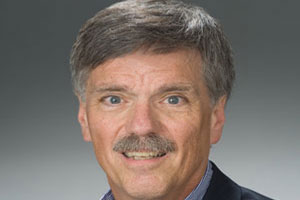Research
Wasil Wins AU Faculty Award for Research

At his core, Professor Edward Wasil is a problem solver.
The Information Technology Department chair and popular professor uses sophisticated mathematical models to solve—as best anyone can—complex, real-world business problems.
For his many years of research excellence, Wasil was awarded the 2011 American University Faculty Award for Outstanding Scholarship.
For years, the paramount problem in Wasil's sights has been developing efficient routes for fleets of vehicles. His models help businesses develop on-the-ground solutions for delivering services and products more effectively.
There are a multitude of factors to consider when determining the most efficient routes and schedules, explained Wasil.
"You have to consider distance, delivery locations, traffic and roadwork, the capacity of each vehicle, the hours a driver can work, the times customers are available to accept deliveries," he said. "It's like peeling an onion. There are many layers to modeling this problem."
Wasil has modeled a wide range of vehicle routing problems, but he's always looking out for the next challenge in the field.
"Many models assume you only have one central depot. But what happens when you have more than one depot? Consider a company like UPS, delivering 16 million packages a day globally," he explained. "The challenge intensifies exponentially."
New Focus
Recently, Wasil and his research partners shifted gears—applying their modeling skills to aid hospitals in planning to prevent the spread of infectious disease and to maximize patient scheduling.
In a project based at the University of Maryland's Medical Center in Baltimore, they created a model to streamline the flow of surgical patients from the operating room to a Post-Anesthesia Care Unit (PACU) and then into an Intensive Care Unit (ICU).
"The hospital had discovered that patients were getting stuck in the PACU, because beds were not available in the ICU. This backed up the surgical schedule," he said. "We created a mathematical solution that ultimately improved the flow of patients out of the PACU, which helps improve outcomes for patients following surgery, and also benefits those who need to get into surgery in a timely way."
Wasil has also helped to create models designed to prevent the spread of the bacterial infection MRSA, a major public health threat facing hospitals across the country. Hospital patients with weakened immune systems or wounds are more susceptible to infections caused by MRSA and, over time, the bacterium has become resistant to common antibiotics.
To solve the problem of MRSA transmission, Wasil and his co-researchers created a model utilizing multiple strategies, including isolating patients with MRSA-related infections, increasing hand-washing and the use of hand sanitizers, and reducing the number of patients treated by each health care provider.
"With a problem like MRSA, you're considering human behavior, which is complex and unpredictable. Our simulation had to portray key individuals—doctors, nurses and patients—as accurately as possible, so that we could determine the right formula for reducing transmission," Wasil explained.
Currently, Wasil is working a new paper that examines MRSA infections and the flow of patients between hospitals and long-term care facilities. "We know MRSA is being spread by patients going back and forth from nursing care to hospital care," he explained. "We're looking at how to stop that from happening, to protect as many patients as we can. This is a problem that can be solved."
Future Outlook
Even with this latest recognition, Wasil—who also won American University's Scholar/Teacher of the Year Award in 2006—has no plans to slow down.
"I'm part of an extremely productive faculty at Kogod," says Wasil. "I'm honored to be recognized this time around, and I expect we'll continue to see Kogod research highlighted in this way."